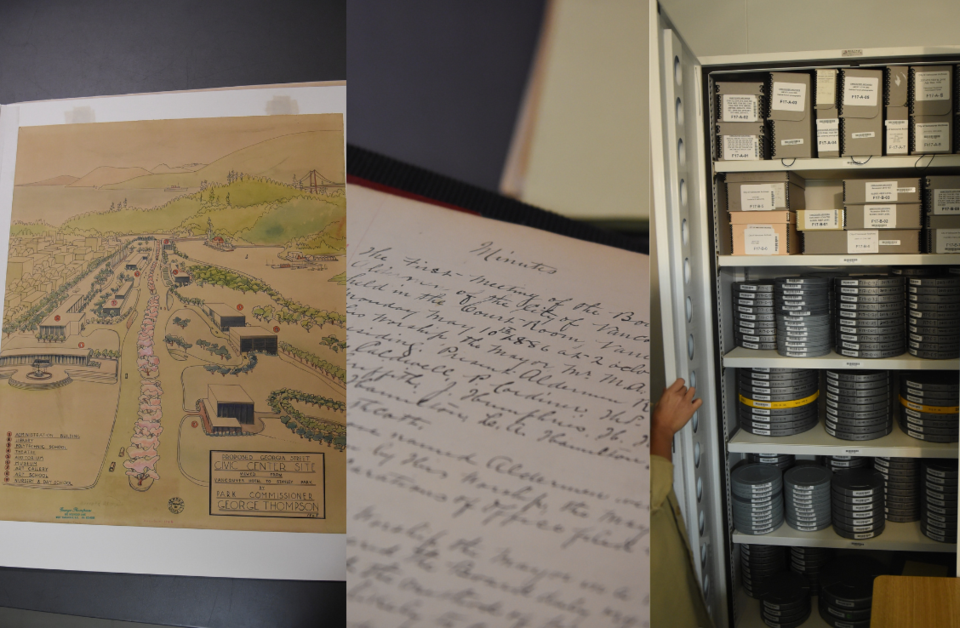Vancouver's archives are a wealth of knowledge.
Being that it's such a young municipality (relatively speaking) there's a good record of the city's official documents, and the city's archives have a huge collection of those records and documents.
They even know who the first employee of the city was (it was the city clerk, who took the minutes at the first meeting, since they had to be hired before the minutes could be taken).
For history buffs, academics and students it's a huge resource, tucked away in Vanier Park near flashier attractions (you know, museums and public art). But there are lots of fun facts about it. Here are some you probably didn't know (and maybe even a bonus if we're feeling it).
1. Vancouver was the first city in English-speaking Canada to start its own archive, by a long shot
Vancouver's archives started in 1933, in great part due to Major J. S. Matthews. Anyone who has looked into Vancouver's history probably recognizes that name.
Back in the 30s he was a big proponent for gathering the city's history, which started out as a personal collection. What started out as a personal project in his home evolved over the years and in 1933 it was made official, with Matthews named the city's first official archivist. He got ahold of artifacts, interviewed early residents, and put out publications.
He didn't always have the best relationship with the city administration, but his work has meant much more of Vancouver's early days is known than if he hadn't worked with the city.
Two other municipal archives pre-date Vancouver, both in Quebec (it's Quebec City (1924) and Montreal (1913)). Other Canadian cities didn't follow suit for another 20 years after Vancouver
2. Vancouver was the first city to build its own municipal archive building
When it comes to municipal archives, Vancouver really led the way.
In 1972 it built a building specifically for the archives (designed by the same architecture company behind the Marine Building). It was right up-to-date with the standards of the times for archives and opened in December of 1972.
In honour of Major Matthews (who passed in 1970) the building was named after him.
3. It's got the coolest office space in Vancouver
To be fair, we haven't taken a thermometer to every office in Vancouver, but it's unlikely any are close. That's because the archivists keep files (specifically old film, slides and photographs) in a deep freeze.
It's a commercial freezer akin to a meat locker, and it's carefully kept cold. Very cold. As in -18 C. Efforts are also made to keep moisture out as well, so it may also be the driest office space in Vancouver.
4. There are 8.8 km of paper records being held by the Vancouver Archives
If you laid out all the paper documents (that's city minutes, maps, photos, etc.) being held by the archives, it'd reach from the archives into Burnaby, or Richmond, or West Vancouver.
That's a lot of paper, and that's just the stuff that started off as paper.
There are also 90 TB of digital-native documents. A lot of that is photos or videos. To give an idea of how much data that is, the average feature film in HD is 2 to 4 GB. For photos, your phone probably takes pics that are about 2 MB in size, so 25,000 photos (jpeg format) on a 50 GB phone. A novel that Steven King writes would be about 2 MB as well.
There are 1,000 GB in a terabyte. And they have 90 TB of stuff.
Netflix has over 4,000 films. Disney has another 500. If they're all on the big side that's 18 TB, leaving room for 18 million iPhone pics and another 18 million novels.
5. They get regular visits from a dog on a job
Dogs have a few different jobs in Vancouver, and there's one that makes the rounds at the archives once in a while.
He's there to sniff out pests, as rodents, like rats and mice, are bad news for old paper records.
Bonus: They have the first minutes from Vancouver's first official council meeting
This may not seem that odd, given that the city was officially founded in 1886, but 140+ years is a lot of time for things to go wrong.
And, for Vancouver, they went wrong immediately, as the Great Vancouver Fire happened just months after the city was founded. Luckily, at the time the minutes weren't very big and they were rescued before the fire destroyed the city.
The book those first minutes are kept in is actually in fairly good shape, thanks to the quality of the paper used at the time.
If you want to check out the archives yourself from home, you can search their digital holdings online.




